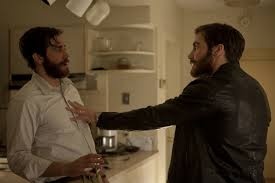
If you see at least one film about a double this year, don’t make it ENEMY. Director Denis Villeneuve’s adaptation of Jose Saramago’s novel, about a schlubby history professor, Adam (Jake Gyllenhaal) who discovers that he has a twin would-be actor, Anthony (Gyllenhaal) whose has interest in executive sex clubs, has the most head scratching ending of any recent movie. It’s like a horror film – DEAD RINGERS meets THE FLY.
Villeneuve won an Oscar for INCENDIES in 2011 and kept the audience of the edge of their seats in PRISONERS last year. He makes films about the uncomfortable side of human behaviour, women becoming terrorists, a man becoming a violent vigilante. They cross over. In ENEMY, there is a cross over too. After discovering that the bellhop in the film ‘Where there’s a will there’s a way’ looks like him, Adam seeks out his double, Anthony Saint Claire, alias Anthony Claire (like the psychiatrist). First, Anthony and his girlfriend (Sarah Gadon) are freaked out by his phone calls. Then she talks to him outside a university building. Then Anthony agrees to meet Adam at a remote hotel. Then Anthony gets the idea that he can sleep with Adam’s girlfriend (Melanie Laurent) if he accuses Adam of sleeping with his wife; she’s over six months pregnant but what the hay? Will he execute this perverted plan? Is this the limit of his exploitation of his double status? What does Adam’s mother (Isabella Rossellini) think?
Portents of doom hang over the drama. Adam is the kind of guy who cannot get his girlfriend to spend an entire night with him. I couldn’t work out why – I mean, it’s dangerous out; you’ve already had sex, I’m not sure Adam hogs the duvet. Streets are near deserted. Sunlight burns the colour out of the surroundings. Adam himself is a morose insular guy who does not make conversation easily; when a colleague asks if he goes to the movies, he replies in the negative. I’m not even sure he has a TV. Then there is the surreal element.
Films about doppelgänger are partly about the fragmented individual, two parts of the whole who live out separate lives and come together uneasily, warily. They look at each other as in the mirror and see they could be something else. The freakish element is that even having lived apart they look exactly alike – different diets, exercise regimes and work schedules have taken them to the same physical point. So it must be in the genes, right?
The promise of a cross over is in their restless lives: Adam doesn’t seem settled whilst Anthony visits this weird club frequented by old, presumably rich people (I wondered if they were extras played by investors in the film) who watch a naked woman being – well, less is more.
If the ending and the pregnancy motif remind you of David Cronenberg’s DEAD RINGERS, the dreamy corridor sequences and Rossellini cameo hint at David Lynch, at present on a self-imposed sabbatical from cinema (so someone has to fill the gap). Rossellini of course appeared as the most maltreated girlfriend in modern cinema in BLUE VELVET as well as having a cameo in WILD AT HEART.
What does it all mean? There is an element that suggests the transmigration of skin – a different person born in the same body, rather than a soul passed between different bodies. Then there’s that Kafkaesque ending that suggests that a person’s real state isn’t fixed.
You can’t really say that ENEMY is a comment on contemporary society. It is existentialist all right, but the same story could have been told at any time in the last two hundred years. You’ve got your Dumas’ THE MAN IN THE IRON MASK and THE PRISONER OF ZENDA), Doestoyevsky’s THE DOUBLE even Vladimir Nabokov’s DESPAIR. These novels were rooted in Europe and explored ideas of birthright, entitlement and self-doubt; if that person can perform so well in my body, what am I doing so wrong? Adam’s lectures are about totalitarian societies limiting access to culture; there is the idea that the double is the eruptive id, the identity that you want to suppress, though here Adam does not want to be Anthony the actor, even though the latter has correct body posture. You want to connect the themes of Adam’s lectures to the movie you are watching. You conclude that the totalitarian exists in the individual: I limit my access to culture, I suppress myself. On a crude level, ENEMY teaches us to read more. It’s a ninety minute fund raiser for the National Endowment of the Arts, but, sadly, not a convincing one.
Reviewed on Sunday 6 April, BFI South Bank , London– part of ICO Cinema Days



